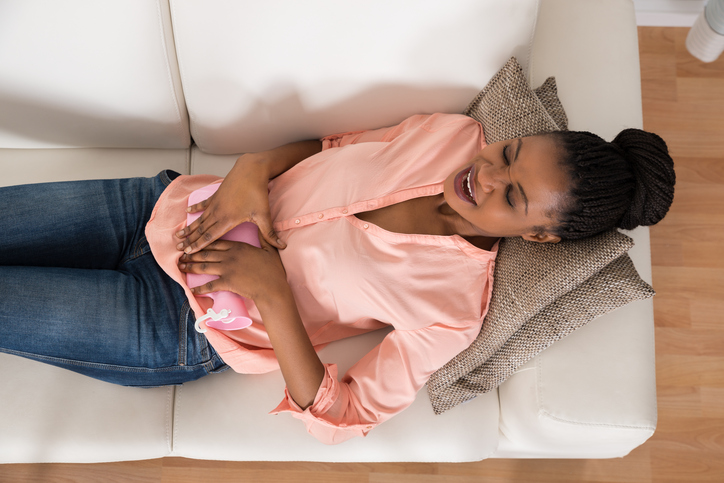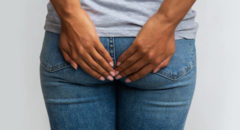 Don’t let pelvic pain put a damper on your weight-loss resolution – i.e., that sexy six-pack you’ve been dreaming of all year long.
Don’t let pelvic pain put a damper on your weight-loss resolution – i.e., that sexy six-pack you’ve been dreaming of all year long.
While mainly associated with your monthly visitor (menstrual cramps), pelvic pain is often a mystery and maybe indicating a more serious health issue.
To get relief, your first step (after the totally legit complaining) should be figuring out what’s wrong.
The following are examples of the different types of pelvic pain. Women believe these are possible causes and origins of the pain.
Always consult your health care provider for a diagnosis.
Localized pain: Maybe due to an inflammation
Cramping: It may be caused by a spasm in a soft organ. These could be the intestine, ureter, or appendix.
Sudden onset of pain: May be caused by a temporary deficiency of blood supply due to an obstruction in the circulation of blood
Slowly-developing pain: Maybe due to inflammation of the appendix or an intestinal obstruction
Pain involving the entire abdomen: May suggest an accumulation of blood, pus, or intestinal contents
Pain aggravated by movement or during the exam: Maybe a result of irritation in the lining of the abdominal cavity
It could also be:
Adenomyosis
Adenomyosis occurs when the tissue that lines the uterus. This is called the endometrium. It is found inside the muscular wall of the uterus itself.
It can cause severe menstrual cramps with heavy, prolonged bleeding.
Some women with adenomyosis feel pain between periods, during sexual activity, or with bowel movements or urination.
Pain may feel like a lower backache or radiate down one or both legs.
Endometriosis
Endometriosis occurs when the endometrial tissue lining the inside of the uterus grows outside of the uterus and attaches to other organs or structures in the body, such as the fallopian tubes or the ovaries.
These abnormal growths are called endometrial implants. Along with adhesions—scar tissue that can cause internal organs to bind together—can inflame surrounding tissues.
Endometriosis does not need to cover extensive areas of the pelvic organs to cause pain; even microscopic implants can cause aching or stabbing pain.
The pain may occur only during menstruation or at various times throughout the menstrual cycle. Many women with endometriosis also have adenomyosis.
Fibroids
Fibroids are typically benign, or noncancerous, masses of tissue that grow on the inner or outer wall of the uterus.
Most fibroids don’t cause pelvic pain unless they’re large and press against other organs or nerves.
For some women, fibroids cause discomfort or pain between periods, as well as during menstruation, urination, bowel movements, or sexual activity.
The condition can also lead to heavy periods or abnormal vaginal bleeding.
Interstitial Cystitis
Interstitial cystitis is a chronic bladder condition that causes frequent urination and mild to severe pain in the bladder and the surrounding area.
It can cause discomfort with sexual activity or urination, an urgent need to urinate, and pressure and tenderness in the pelvis.
Symptoms can be mistaken for a urinary tract infection. It can vary with diet.
Ovarian Cysts
Ovarian cysts are fluid-filled sacs. It can also be benign (noncancerous) growths that can form in or on the ovaries.
They may cause pain in the pelvis, especially if they bleed or rupture, or in the low back.
Pain may strike suddenly or be ongoing; it may feel like a dull ache or a lingering pressure as the cyst pushes on another pelvic organ, such as the bladder.
Exercise, urination, sexual activity, or menstruation may make the pain worse.
Some ovarian cysts go away without treatment, but some may require surgery, especially those related to endometriosis or other conditions. Large ovarian cysts may cause the ovary to twist, cutting off its blood supply, possibly requiring emergency surgery to save the ovary.
Pelvic Congestion Syndrome
Pelvic congestion syndrome results from pelvic varicose veins. These are abnormal, enlarged veins in the pelvis. They are similar to varicose veins that occur in the legs.
They start in the ovarian veins, the deep veins of the pelvis, or sometimes both. The cause of the enlargement is not always known. It could be associated with prior pregnancy, pelvic surgery, and estrogen replacement therapy.
Symptoms of pelvic congestion syndrome include chronic pelvic pain, often described as dull or aching, that is worst when sitting or standing and improves when lying down.
Other symptoms include pain after intercourse, fatigue, backache, bloating, nausea, and leg fullness. Some women may have visible varicose veins of the vulva, buttocks, and upper thighs.
Pelvic Inflammatory Disease
Pelvic inflammatory disease, sometimes called PID, is a complex infection that affects a woman’s reproductive organs—the cervix, uterus, fallopian tubes, and ovaries.
It’s the result of an untreated sexually transmitted infection such as chlamydia.
Without treatment, pelvic inflammatory disease can cause irreversible scarring to the pelvic organs and lead to infertility.
Seek Expert Advice
Talk to your doctor about these other possibilities if the pain is consistent or reoccurring:
It’s cancerous: Though rare (fewer than 200,000 US cases per year), ovarian cancer begins in the ovaries and may cause menstrual irregularities, back, abdominal or pelvic pain, frequent urination, bloating and indigestion.
It’s gynecological: When uterine tissue grows outside the uterus (ovaries, fallopian tubes or the intestines), also called endometriosis, it can cause severe pain with urination and bowel movements during menstruation, pain during sex, frequent yeast infections and fatigue.
According to Reproductive Science and the Journal of Endometriosis, the disorder affects an estimated 1 in 10 women during their reproductive years (usually between the ages of 15 to 49). That’s approximately 176 million women in the world.
Although the exact cause of endometriosis is unclear, possible explanations include:
- Retrograde menstruation: This occurs when menstrual blood containing endometrial cells flows back through the fallopian tubes. Then, it goes into the pelvic cavity instead of exiting the body. These displaced cells then stick to the pelvic wall and surfaces of pelvic organs. That's where they grow, thicken, and bleed throughout the course of each period.
- Surgical scar implantation: After surgery, like a hysterectomy or C-section, endometrial cells may attach to a surgical incision.
- Immune system disorders: It's possible that a problem with the immune system may make the body unable to recognize and destroy endometrial tissue growing outside of the uterus.
It’s physical:
While it sounds a bit farfetched, your partner’s man junk may be to blame.
If his penis is large, intercourse can bruise your cervix or worse, tear the opening of your vagina. An injury from a fall may also be responsible.
It’s intestinal or urological:
Chronic constipation is onset by simple things like insufficient levels of dietary fiber or neglecting to drink your fluids.
It may trigger pain in the muscles of the pelvic floor, malfunctions such as colitis, and irritable bowel syndrome (IBS).
Then there’s interstitial cystitis, also called IC.
It's chronic inflammation in the bladder that can lead to pain and pressure during urination. It can also cause the urge to urinate frequently. Many think it is a urinary tract infection (UTI).
In spite of it all, remember that it’s fixable! While the discomfort may be chronic, you don’t have to suffer.
According to experts, there are countless remedies that can reduce and/or eliminate symptoms altogether. Treatments include pain relievers, physical therapy, hormonal therapy, antibiotics, antidepressants, counseling, relaxation exercises, or surgery.
So, take a deep breath. Peek your head into the doctor’s office and rest in knowing that relief is right around the corner.








